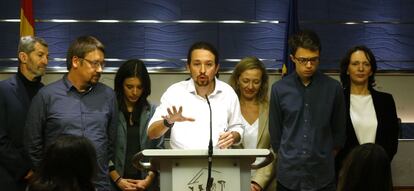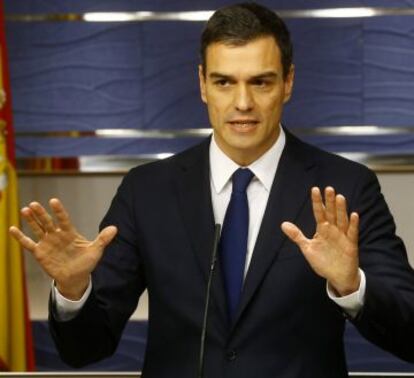Political stalemate continues as Rajoy refuses investiture offer from king
Ball left in court of Podemos and Socialists, but left-leaning parties fail to agree on pacts

Spain came no closer to seeing a government formed this weekend, after acting Prime Minister Mariano Rajoy on Friday declined the formal offer from King Felipe VI to stand as prime ministerial candidate at the first investiture session in Congress.
The move leaves the ball in the court of the Socialist Party (PSOE) and Podemos, who have the potential to reach an agreement to form a government. However, the leaders of these two left-leaning parties, Pedro Sánchez (PSOE) and Pablo Iglesias (Podemos), failed on Sunday to agree on the time frame for reaching such a deal.
Six out of 10 voters believe negotiations would be easier if the PP’s candidate for prime minister were not Rajoy
Speaking after his meeting with the king on Friday evening, Rajoy thanked the monarch for the “gesture and the offer” to stand at the first investiture session as prime ministerial candidate. But he declined the “deference,” saying that he did not currently have the votes needed to be successful.
“I have told the king that I will keep working to secure a sufficient majority,” he told reporters.
Rajoy went on to say that he did not want to see Spain have to hold new elections, but that neither was he willing to withdraw his candidacy, nor step down as leader of the Popular Party. He would, he explained, offer Sánchez and Ciudadanos leader Albert Rivera a government of consensus in order to achieve basic reforms.
Rajoy’s decision followed another surprise announcement earlier in the day, when Podemos leader Pablo Iglesias told the king and then shortly after the assembled press of his desire to form a government in partnership with the Socialists, in which he would take on the role of deputy prime minister.

The move took many – in particular the Socialists – by complete surprise, and, combined with Rajoy’s refusal to stand in the investiture session, leaves the ball very much in the court of the left-leaning parties.
In a telephone conversation on Sunday, Sánchez and Iglesias disagreed over the time frame for beginning negotiations. In a 20-minute call, Sánchez admonished Iglesias for the surprise announcement made on Friday, while the Podemos leader insisted on the need to begin talks. Sánchez, reportedly, would rather wait. The pair are due to talk again this week.
Until the king finishes the second round of meetings with political leaders, Sánchez wants to engage in “dialogue” but not “negotiate” pacts, and as such is unwilling to respond to Iglesias’s offer “of government.” First we will deal with “the what,” sources from the PSOE have said, and then we’ll deal with “the how.”
A Metroscopia poll released on Sunday by EL PAÍS reveals that the majority of voters reject the slow pace with which their political leaders are dealing with the formation of a new government. Six out of 10 voters believe that the negotiations would be easier if the Popular Party’s candidate for prime minister were not Mariano Rajoy. Meanwhile, half consider that the negotiations would be more successful if the PSOE were not led by Pedro Sánchez.
The inconclusive general election of December 20 yielded a hung parliament with 123 seats going to the incumbent Popular Party (PP), 90 to the PSOE and 69 to Podemos (although the latter’s congressional group now has 65 deputies after four regional associates decided to go it alone). IU has two seats.
Since then, parties have been scrambling to forge allegiances for a congressional majority of 176 seats.
English version by Simon Hunter.
Tu suscripción se está usando en otro dispositivo
¿Quieres añadir otro usuario a tu suscripción?
Si continúas leyendo en este dispositivo, no se podrá leer en el otro.
FlechaTu suscripción se está usando en otro dispositivo y solo puedes acceder a EL PAÍS desde un dispositivo a la vez.
Si quieres compartir tu cuenta, cambia tu suscripción a la modalidad Premium, así podrás añadir otro usuario. Cada uno accederá con su propia cuenta de email, lo que os permitirá personalizar vuestra experiencia en EL PAÍS.
¿Tienes una suscripción de empresa? Accede aquí para contratar más cuentas.
En el caso de no saber quién está usando tu cuenta, te recomendamos cambiar tu contraseña aquí.
Si decides continuar compartiendo tu cuenta, este mensaje se mostrará en tu dispositivo y en el de la otra persona que está usando tu cuenta de forma indefinida, afectando a tu experiencia de lectura. Puedes consultar aquí los términos y condiciones de la suscripción digital.








































